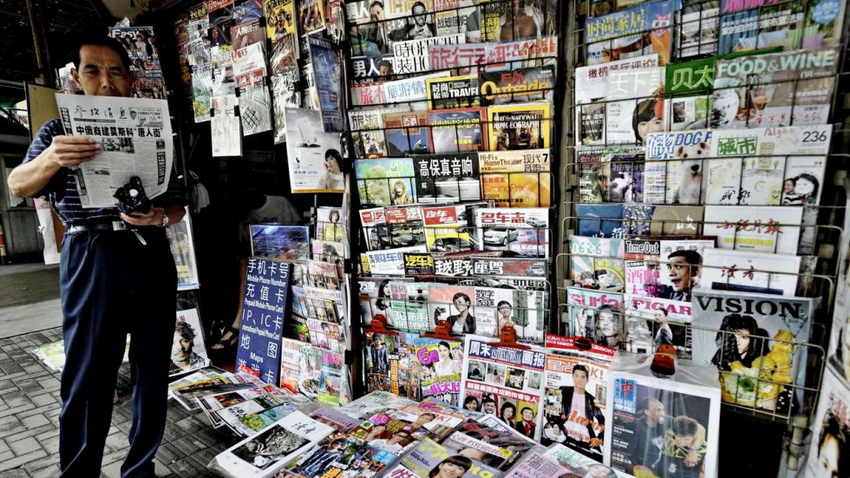


Proper reporting on Africa demands physical field presence
Let me begin this "conversation" this way. A people’s world view, like the expression suggests, goes a long way in shaping the manner in which they see the world around them. And so for such a people, the world is defined by what their world view says.
Through the eyes of world view
Ancient Chinese considered their great nation - or empire at the time - to be in the centre of the world. This is why Chinese refer to their country in their language as “zhōng guó,” literally meaning “middle or central country, kingdom or region.” This is based on the ancient traditional view that China is in the centre of the civilized world, surrounded by barbarians.
Such a view – dropping the barbarian aspect – is still held by many Chinese today. This probably explains why the Chinese version of world map actually places the country at the centre of the globe. In this way, Europe and Africa are brought closer to China; while North and South America find themselves in the Far East!

Chinese media need to do more to report the true Africa
China and Ile-Ife in Nigeria, all in the centre of the world!
While ancient Chinese considered their empire to be located in the middle of the world, other people elsewhere also lay claim to the same world view. The Yoruba ethnic nationality in the city of Ile-Ife in southwestern Nigeria has always seen its location as being in the very centre of the world. And so, their creation myth vigorously supports this world view.
Depending therefore on the version of world map you use, Africa could be so close or far from China. But with the advent of the concept of the world becoming a global village, the distance has somehow been bridged.
Chinese media reporting on Africa
So how does the Chinese media report Africa? I will say fairly well, for the little that is done. Granted that the Xinhua News Agency has bureaux in many African countries and China Global Television Network, CGTN, China Central Television, CCTV and China Radio International, CRI, all broadcast to the continent in a good number of languages. And that several Chinese media now run websites and other New Media outlets that report Africa. This is already a good beginning.
But how many Chinese journalists have been in Africa before? Apart from the few Chinese media with correspondents in Africa, my guess is that many Chinese journalists tend to see, understand or report Africa through the eyes of Western media. This is what all 27 of us journalists from 27 different African nations currently taking part in the 10-month China-Africa Press Centre, CAPC exchange programme were doing before arriving in China last February.
Our reporting of China was for the most part based on what the Western media said. But we have since discovered a China far, far different from what the Western media says. In fact, the Chinese people and leadership never stop amazing us with their devotion, commitment, hard work and focused development strides. Reason why almost every part of the country is a permanent 24-hour work site.
Few African correspondents in China
During the Two Sessions last March, I ran into the Beijing correspondent of Nigeria’s public broadcaster, Nigerian Television Authority, NTA. If I were to go by what she told me earlier this week, she and an Egyptian journalist are probably the only accredited African correspondents in Beijing and China as a whole.
With such a little number – apart from our presence in China for 10 months – it is obvious how insufficient Africa reports China from the inside the country.
Non-negligible efforts of Chinese authorities
It must however be acknowledged that Chinese authorities have been doing a great job in enabling African journalists to see for themselves and understand the real China. Hardly does a month go by without news of African journalists and communications professionals arriving in China for a seminar, workshop or experience-sharing.
As we speak, there are 60 Sierra Leonean journalists on short-term courses in China. One group of 30 will spend three weeks, while the other will be around for three months. There are probably many more other African media professionals visiting China now. We, the current 27 CAPC participants are also beneficiaries of such efforts by China to bridge the information gap.

More person-to-person exchanges between Chinese and Africans boost understanding and cooperation
Experience of Cameroonian journalist
My wife told me on phone the story of a colleague from my newspaper back home who attended a three-week seminar in China last month alongside over 30 French-speaking journalists from Africa. My wife went to meet him at the airport the day he returned to collect a little parcel I sent to her.
She said throughout the short distance they drove in his car from the airport before she alighted to board a cab back home, the young man never stopped telling his wife and driver the marvels of China’s development!
He promised to show hundreds of pictures he had taken to prove to them that China is not actually what many people in Cameroon think. This journalist’s wife and driver listened with rapt attention as he narrated different aspects of China’s high level of development in quick succession.
The conclusion of my wife was that if this man who spent only three weeks in China, visiting only one province had so much to tell about the country, how much more me when I return home after 10 months. Experiences like this help in shaping how Africans see China and how its media reports this vast nation that never stops being a technological, industrialization, prosperity and poverty reduction marvel.

Seeing Africa and China only through the eyes of Western media often misses the real picture
Discovering the true China!
Since arriving in China last February, we have had occasion to cover major national and international events, as well as visiting three provinces and an autonomous region. This has greatly improved our understanding of this big nation and its various ethnic groups.
While China spends millions bringing over hundreds of African journalists each year for training on its soil, it is time the authorities and stakeholders thought of doing the reverse. There can be no better way of helping Chinese journalists understand the complexities of Africa without having to go on the field. If we African journalist never came to China, our view of the country will still be the same today – shaped largely by what Western media reports say.
Better reporting prospects ahead
Nevertheless, the wheel of media exchange is already rolling. The more African journalists come over to China, the more the exchanges amongst the two parties. And the more Africans report for Chinese media, the more the level of understanding about the continent will grow amongst Chinese journalists. Though Africa will still be very far physically, it will nevertheless become closer to Chinese journalists in terms of their understanding and reporting the continent.
This opinion piece was presented at Tsinghua University, Beijing, China on August 4 during a seminar on China-Africa media reporting.
Kimeng Hilton Ndukong, Sub-Editor for World News with Cameroon Tribune bilingual daily in Cameroon, is currently on media attachment with People’s Daily online in English. He is member of the 2017 China-Africa Press Centre exchange programme.

 Award-winning photos show poverty reduction achievements in NE China's Jilin province
Award-winning photos show poverty reduction achievements in NE China's Jilin province People dance to greet advent of New Year in Ameiqituo Town, Guizhou
People dance to greet advent of New Year in Ameiqituo Town, Guizhou Fire brigade in Shanghai holds group wedding
Fire brigade in Shanghai holds group wedding Tourists enjoy ice sculptures in Datan Town, north China
Tourists enjoy ice sculptures in Datan Town, north China Sunset scenery of Dayan Pagoda in Xi'an
Sunset scenery of Dayan Pagoda in Xi'an Tourists have fun at scenic spot in Nanlong Town, NW China
Tourists have fun at scenic spot in Nanlong Town, NW China Harbin attracts tourists by making best use of ice in winter
Harbin attracts tourists by making best use of ice in winter In pics: FIS Alpine Ski Women's World Cup Slalom
In pics: FIS Alpine Ski Women's World Cup Slalom Black-necked cranes rest at reservoir in Lhunzhub County, Lhasa
Black-necked cranes rest at reservoir in Lhunzhub County, Lhasa China's FAST telescope will be available to foreign scientists in April
China's FAST telescope will be available to foreign scientists in April